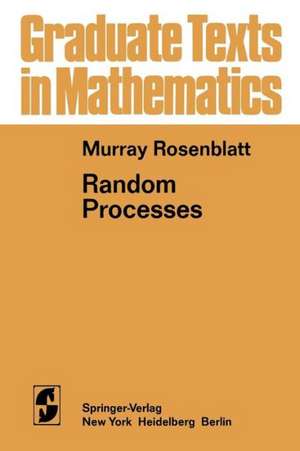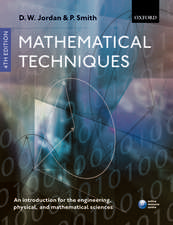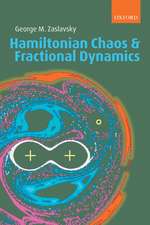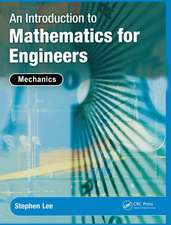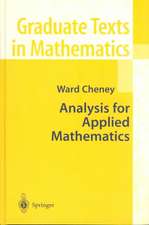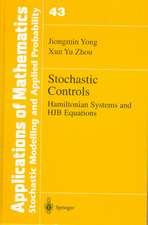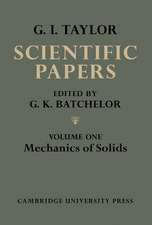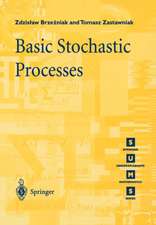Random Processes: Graduate Texts in Mathematics, cartea 17
Autor M. Rosenblatten Limba Engleză Paperback – 12 dec 2011
Din seria Graduate Texts in Mathematics
-
 Preț: 337.45 lei
Preț: 337.45 lei - 17%
 Preț: 528.66 lei
Preț: 528.66 lei -
 Preț: 383.85 lei
Preț: 383.85 lei -
 Preț: 402.87 lei
Preț: 402.87 lei - 17%
 Preț: 398.97 lei
Preț: 398.97 lei -
 Preț: 355.82 lei
Preț: 355.82 lei -
 Preț: 411.83 lei
Preț: 411.83 lei -
 Preț: 404.47 lei
Preț: 404.47 lei -
 Preț: 289.88 lei
Preț: 289.88 lei - 17%
 Preț: 365.79 lei
Preț: 365.79 lei - 17%
 Preț: 359.45 lei
Preț: 359.45 lei -
 Preț: 450.64 lei
Preț: 450.64 lei - 15%
 Preț: 488.70 lei
Preț: 488.70 lei - 17%
 Preț: 430.49 lei
Preț: 430.49 lei - 13%
 Preț: 357.75 lei
Preț: 357.75 lei -
 Preț: 407.88 lei
Preț: 407.88 lei - 13%
 Preț: 352.49 lei
Preț: 352.49 lei - 13%
 Preț: 358.86 lei
Preț: 358.86 lei - 13%
 Preț: 393.48 lei
Preț: 393.48 lei - 11%
 Preț: 351.00 lei
Preț: 351.00 lei - 17%
 Preț: 359.58 lei
Preț: 359.58 lei -
 Preț: 350.45 lei
Preț: 350.45 lei -
 Preț: 399.74 lei
Preț: 399.74 lei -
 Preț: 498.91 lei
Preț: 498.91 lei - 20%
 Preț: 571.26 lei
Preț: 571.26 lei - 15%
 Preț: 546.59 lei
Preț: 546.59 lei -
 Preț: 498.69 lei
Preț: 498.69 lei - 15%
 Preț: 354.39 lei
Preț: 354.39 lei -
 Preț: 313.10 lei
Preț: 313.10 lei - 13%
 Preț: 427.39 lei
Preț: 427.39 lei - 17%
 Preț: 363.59 lei
Preț: 363.59 lei -
 Preț: 340.18 lei
Preț: 340.18 lei - 17%
 Preț: 364.47 lei
Preț: 364.47 lei - 17%
 Preț: 366.47 lei
Preț: 366.47 lei - 17%
 Preț: 366.06 lei
Preț: 366.06 lei -
 Preț: 247.59 lei
Preț: 247.59 lei - 17%
 Preț: 367.70 lei
Preț: 367.70 lei - 13%
 Preț: 356.79 lei
Preț: 356.79 lei - 17%
 Preț: 398.78 lei
Preț: 398.78 lei - 17%
 Preț: 398.51 lei
Preț: 398.51 lei - 17%
 Preț: 496.63 lei
Preț: 496.63 lei - 15%
 Preț: 482.97 lei
Preț: 482.97 lei -
 Preț: 401.99 lei
Preț: 401.99 lei - 17%
 Preț: 366.56 lei
Preț: 366.56 lei - 20%
 Preț: 449.73 lei
Preț: 449.73 lei -
 Preț: 380.34 lei
Preț: 380.34 lei -
 Preț: 364.79 lei
Preț: 364.79 lei - 17%
 Preț: 427.27 lei
Preț: 427.27 lei -
 Preț: 358.07 lei
Preț: 358.07 lei
Preț: 385.08 lei
Nou
Puncte Express: 578
Preț estimativ în valută:
73.69€ • 76.47$ • 61.60£
73.69€ • 76.47$ • 61.60£
Carte tipărită la comandă
Livrare economică 15-29 martie
Preluare comenzi: 021 569.72.76
Specificații
ISBN-13: 9781461298540
ISBN-10: 1461298547
Pagini: 244
Ilustrații: 228 p.
Dimensiuni: 155 x 235 x 13 mm
Greutate: 0.35 kg
Ediția:2nd ed. 1974. Softcover reprint of the original 2nd ed. 1974
Editura: Springer
Colecția Springer
Seria Graduate Texts in Mathematics
Locul publicării:New York, NY, United States
ISBN-10: 1461298547
Pagini: 244
Ilustrații: 228 p.
Dimensiuni: 155 x 235 x 13 mm
Greutate: 0.35 kg
Ediția:2nd ed. 1974. Softcover reprint of the original 2nd ed. 1974
Editura: Springer
Colecția Springer
Seria Graduate Texts in Mathematics
Locul publicării:New York, NY, United States
Public țintă
ResearchCuprins
I. Introduction.- II. Basic Notions for Finite and Denumerable State Models.- a. Events and Probabilities of Events.- b. Conditional Probability, Independence, and Random Variables.- c. The Binomial and Poisson Distributions.- d. Expectation and Variance of Random Variables (Moments).- e. The Weak Law of Large Numbers and the Central Limit Theorem.- f. Entropy of an Experiment.- g. Problems.- III. Markov Chains.- a. The Markov Assumption.- b. Matrices with Non-negative Elements (Approach of Perron-Frobenius).- c. Limit Properties for Markov Chains.- d. Functions of a Markov Chain.- e. Problems.- IV. Probability Spaces with an Infinite Number of Sample Points.- a. Discussion of Basic Concepts.- b. Distribution Functions and Their Transforms.- c. Derivatives of Measures and Conditional Probabilities.- d. Random Processes.- e. Problems.- V. Stationary Processes.- a. Definition.- b. The Ergodic Theorem and Stationary Processes.- c. Convergence of Conditional Probabilities.- d. MacMillan’s Theorem.- e. Problems.- VI. Markov Processes.- a. Definition.- b. Jump Processes with Continuous Time.- c. Diffusion Processes.- d. A Refined Model of Brownian Motion.- e. Pathological Jump Processes.- f. Problems.- VII. Weakly Stationary Processes and Random Harmonic Analysis.- a. Definition.- b. Harmonic Representation of a Stationary Process and Random Integrals.- c. The Linear Prediction Problem and Autoregressive Schemes.- d. Spectral Estimates for Normal Processes.- e. Problems.- VIII. Martingales.- a. Definition and Illustrations.- b. Optional Sampling and a Martingale Convergence Theorem.- c. A Central Limit Theorem for Martingale Differences.- d. Problems.- IX. Additional Topics.- a. A Zero-One Law.- b. Markov Chains and Independent Random Variables.- c. A Representation for aClass of Random Processes.- d. A Uniform Mixing Condition and Narrow Band-Pass Filtering.- e. Problems.- References.
